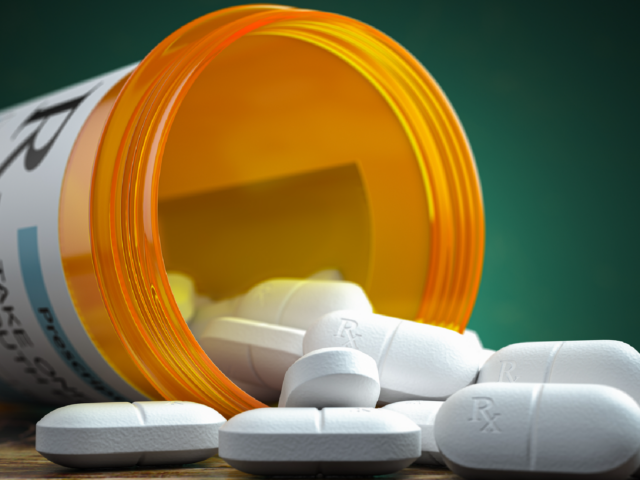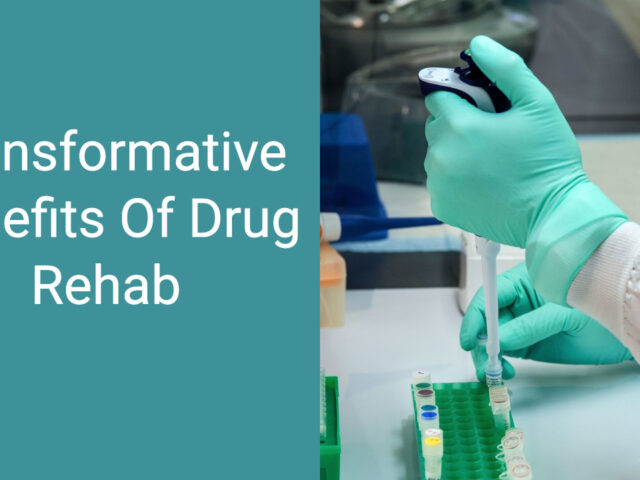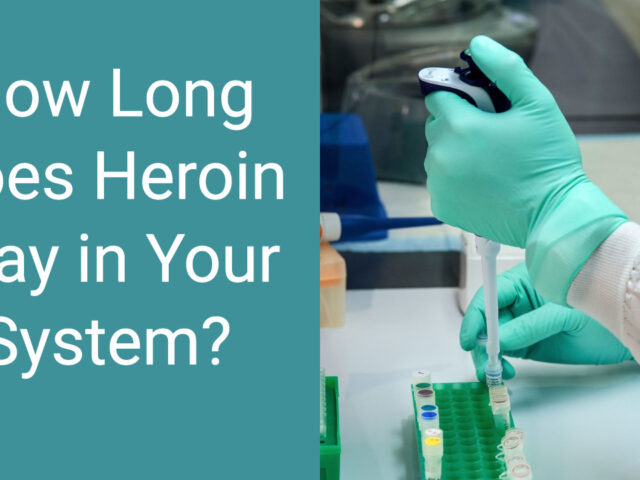Most people who become addicted [to opioids] like me do so after a prescription for a painkiller following a medical procedure. Once the phenomenon of craving sets in, it is often too late ~Jamie Lee Curtis
Opioids are a classification of drugs often referred to as opiates or narcotics. Doctors prescribe opioids for their painkilling properties. However, at certain doses, opioid use may also produce a euphoric high. Opioids have addictive properties, and opioid users are at a higher risk of developing an addiction. If you or a loved one is struggling with opioid use disorder (OUD) and in need of qualitative opioid treatment programs, you must know the signs and symptoms of opioid use disorder and general substance abuse to get the opioid use disorder treatment you—or your loved one—need.
Signs and Symptoms of Opioid Addiction
Opioids are highly addictive—prescribed or illicit—with an increased potential for substance abuse and an increased risk of developing an addiction known as Substance Use Disorder (SUD).
The causes of opioid drug misuse are unknown. Yet researchers are looking to understand better the risk factors associated with OUD.Several types of opioids exist, both illicit and prescription. The most common opioid drugs include:
- Methadone
- Codeine
- Morphine
- Heroin
- Hydromorphone (Dilaudid)
- Oxycodone (OxyContin, Percocet)
- Hydrocodone (Vicodin, Norco)
- Fentanyl (Actiq, Duragesic, Sublimaze)
Opioids activate the reward system in your brain and are key to OUD.1
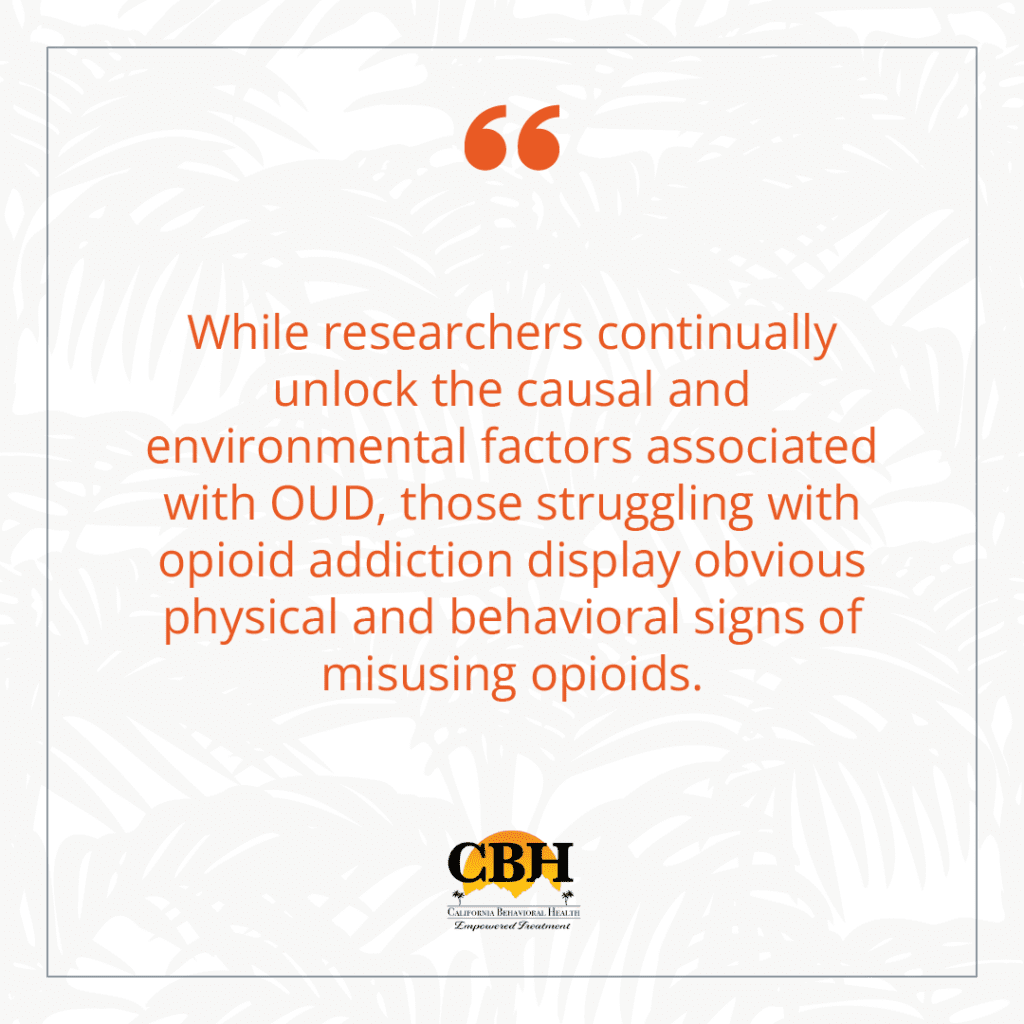
The Diagnostic and Statistical Manual of Mental Disorders, Fifth Edition (DSM-5) classifies OUD—a form of substance use disorder (SUD)—by the following signs and symptoms:
- Taking opioids in larger amounts or for longer than intended
- Unable to stop or reduce usage
- Spending excess time obtaining, using, or recovering from using opioids
- Intense cravings and strong urges to use opioids
- Using even though it causes issues in your relationships
- Keeps you from fulfilling your obligations
- Increased tolerance
- Experiencing withdrawal symptoms when going without the substance
Short-term signs and symptoms
- Confusion
- Euphoria
- Drowsiness
- Constipation
- Nausea
- Slowed breathing
- Hypoxia (can also occur as a long-term symptom)
Long-term signs and symptoms
- Neurological changes
- Behavioral changes and mood swings
- Psychological effects
- Physical effects (twitching, ticks)
- Memory issues
- Being emotionally detached
- Coma
- Permanent brain damage
- Death
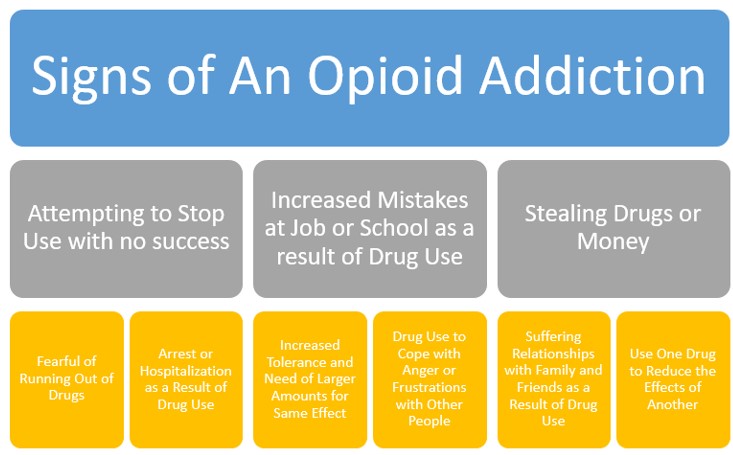
Risk Factors for Opioid Addiction
Researchers believe a combination of environmental, genetic, and developmental factors influence your risks for opioid use disorder. The more risk factors you have, the greater the likelihood that taking opioids could lead to a SUD.
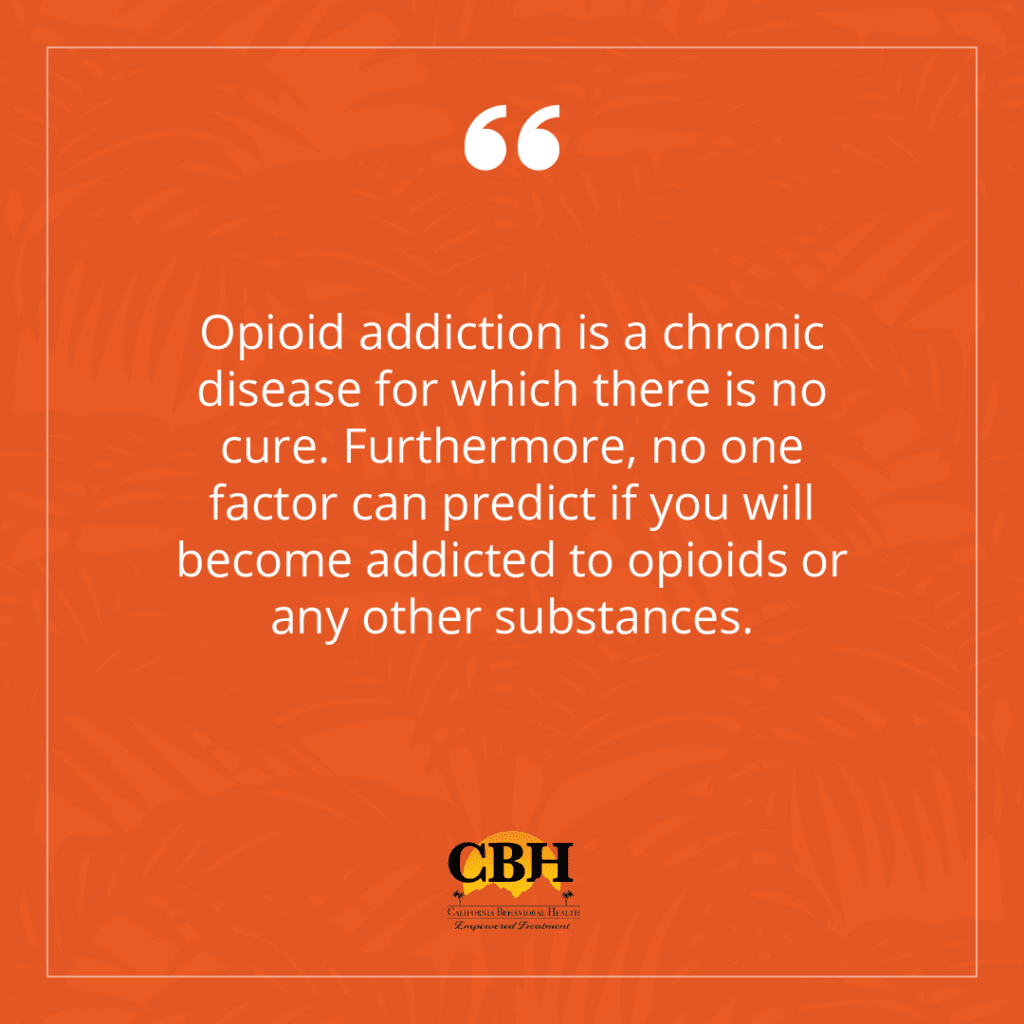
Risk factors include the following:
- Biology
- Environment
- Development
- Chronic pain
- Lack of knowledge or social support
- Access or previous exposure
- Personal or family history of addiction
- Physical trauma or stress
- Unresolved emotional or physical abuse
- Age of initial use
Remember, risk factors are just that— having risk factors alone does not define an individual as an addict, however risk factors may increase the likelihood of that individual becoming addicted. While there is no cure, opioid use disorder is treatable.
How to Treat Opioid Addiction
Effective treatment for opioid use disorder begins with detox.
For some Palm Springs drug rehab patients, a safe medical detox is the only way to ensure that opioid withdrawal symptoms don’t become deadly.
Residential, various levels of outpatient, and hospital-based programs are available.
Medications
Doctors prescribe OUD patients one of three types of medications which include:11,12
- Methadone (Dolophine, Methadose)
- Buprenorphine (Subutex, Suboxone, Sublocade, Probuphine)
- Naltrexone (Vivitrol®)
Each of these medications targets the brain the same way that morphine and heroin do, and methadone and buprenorphine specifically work to suppress your opioid withdrawal symptoms and eliminate your cravings that are common during opioid withdrawal.
Naltrexone, on the other hand, works by blocking the opioid’s effects on your brain’s receptors. Doctors typically prescribe this medication for patients who have already been through detox.
Each of these medications reduces drug-seeking behaviors and related criminal activity. They will also prepare you mentally for behavioral therapy and treatment.
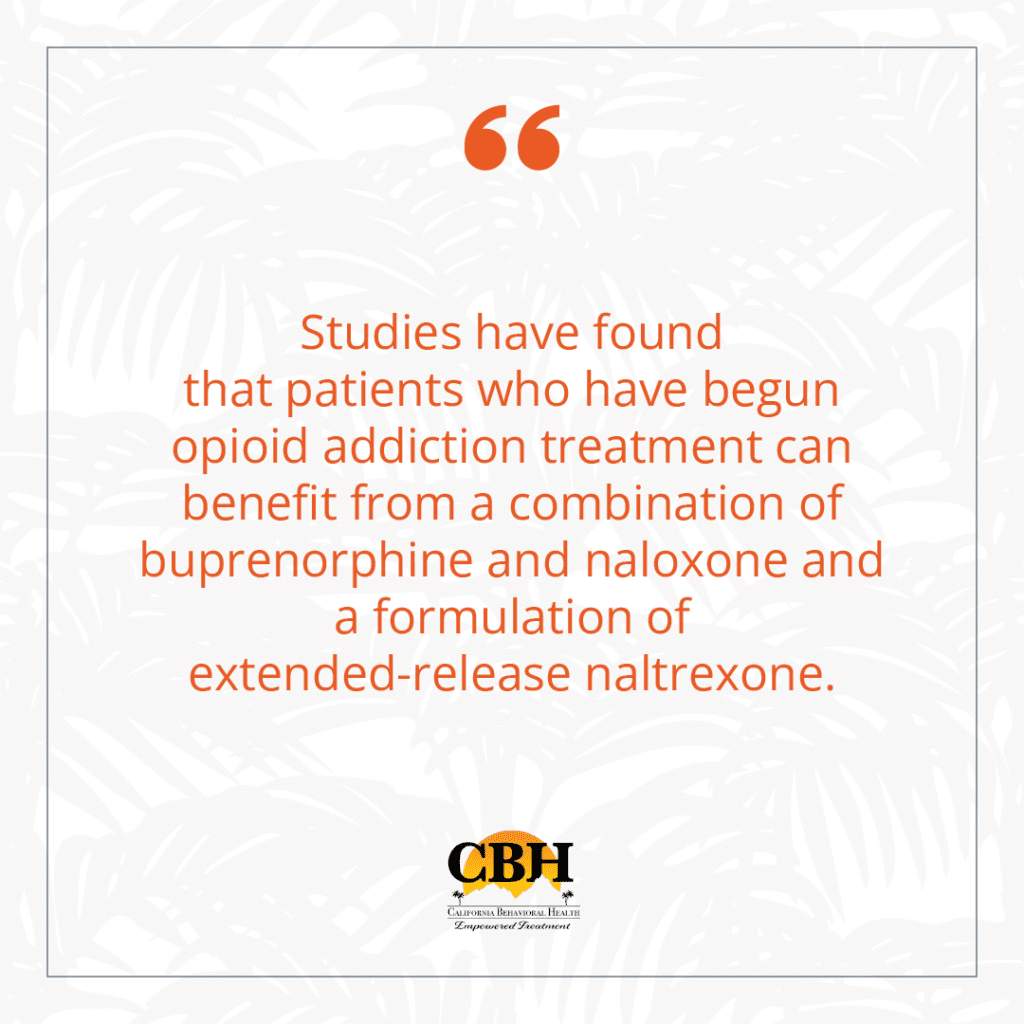
Aftercare and Ongoing Support
Ongoing support through withdrawal symptoms and aftercare are essential for long-term recovery from opioid use disorder.
Care from a certified opioid treatment program increases your chances of staying clean and avoiding renewed physical dependence on opioids.
After detox, you and your treatment specialist can create a personalized plan involving a step-down approach to treatment. You may opt to join a residential treatment program or one of the various outpatient treatment plans available. Support groups like Alcoholics Anonymous (AA), Narcotics Anonymous (NA), Celebrate Recovery, SMART Recovery, Refuge Recovery, and sober living facilities can increase your chances of success in avoiding relapse and maintaining long-term sobriety.
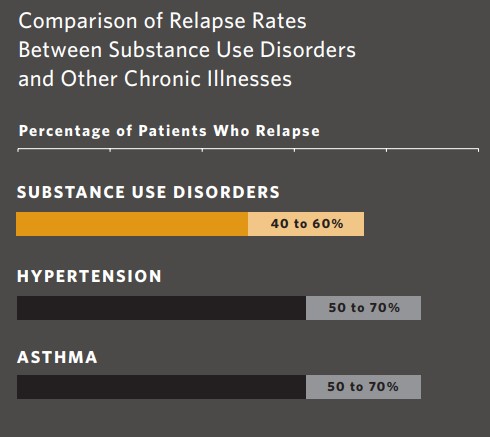
Start the Road to Opioid Recovery
Recovery from opioid use disorder is possible with the support of our expert specialists in our treatment programs. We work with you to develop a personalized treatment plan that meets your needs. Get the compassionate care you need to begin your journey to find long-term recovery. We’ll be right by your side every step of the way.
Contact us today to speak to a treatment support specialist for more information about opioid addiction and how to begin your recovery journey.
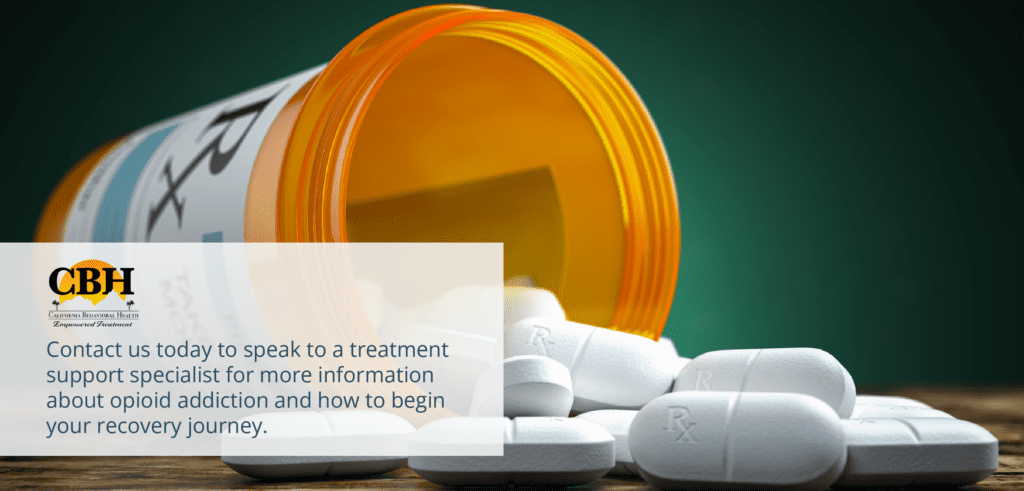
Frequently Asked Questions About Opioid Addiction
You may have questions if you or a loved one struggles with OUD. Here are some of the most frequently asked regarding opioid addiction:
What are opioids?
Physicians have used opioid medications to treat pain, cough, or even diarrhea, and they are available in capsules, tablets, skin patches, injectables, oral liquids, and suppositories. Along with prescription opioids, there are also illicit opioids available. Illicit opioids are often ingested in powdered or chunky form ranging from white to brown or black in color.
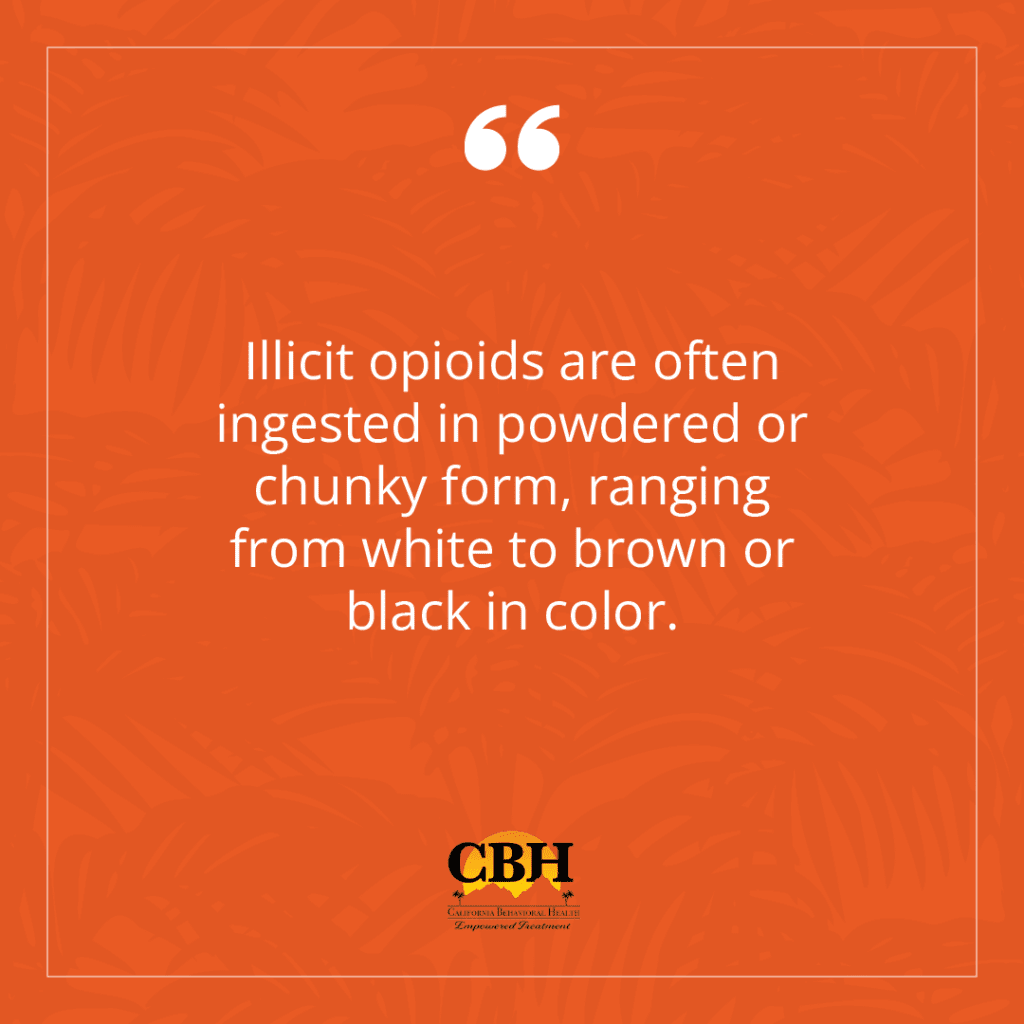
What is the difference between opiates and opioids?
Opioid is a broad term when describing any substance under that drug classification. It can be either synthetic (man-made) or naturally produced in the environment. Poppy seeds are an example of an opiate, while fentanyl is an opioid because it does not exist in nature on its own.
What are the physical signs of opioid addiction?
The physical signs of opioid use disorder include drowsiness, euphoria, confusion, and nausea. It can also cause your breathing to become slow. If you take opioids with alcohol, you may experience a dangerously slow heart rate. Long-term use could result in neurological and behavioral changes and could result in permanent brain damage.
Are there support groups for opioid addiction?
Yes. You can receive addiction care treatment through California Behavioral Health and also attend group meetings, such as:
- AA
- NA
- Celebrate Recovery
- Other group therapies
How long is rehab for opioid addiction?
Most rehab facilities offer 30-, 60-, or 90-day programs focused on the early stages of rehabilitation and recovery. Rehab usually means you have chosen to stay at a residential treatment facility, although outpatient rehab is available.
Is in-patient treatment for opioid addiction available near me?
Yes! At California Behavioral Health, our addiction and mental health treatment facility takes a holistic approach to your recovery journey, offering you the personalized care you need for long-term sobriety. Every patient at our facility is provided with their own bedroom and bathroom, ensuring a private and comfortable environment that is conducive to recovery.
Our highly experienced staff understands the science behind behavioral health, mental health and addiction treatment.








